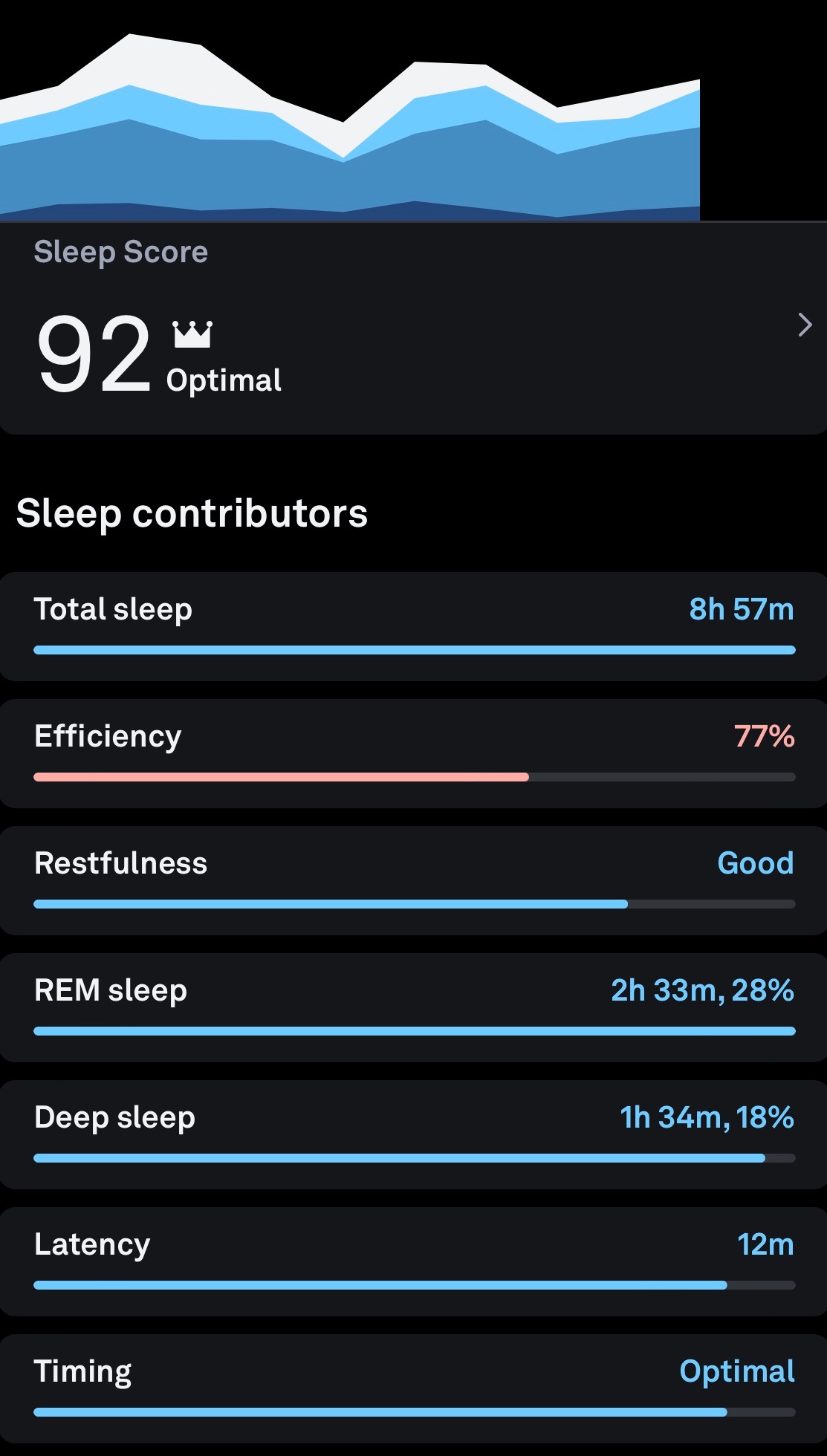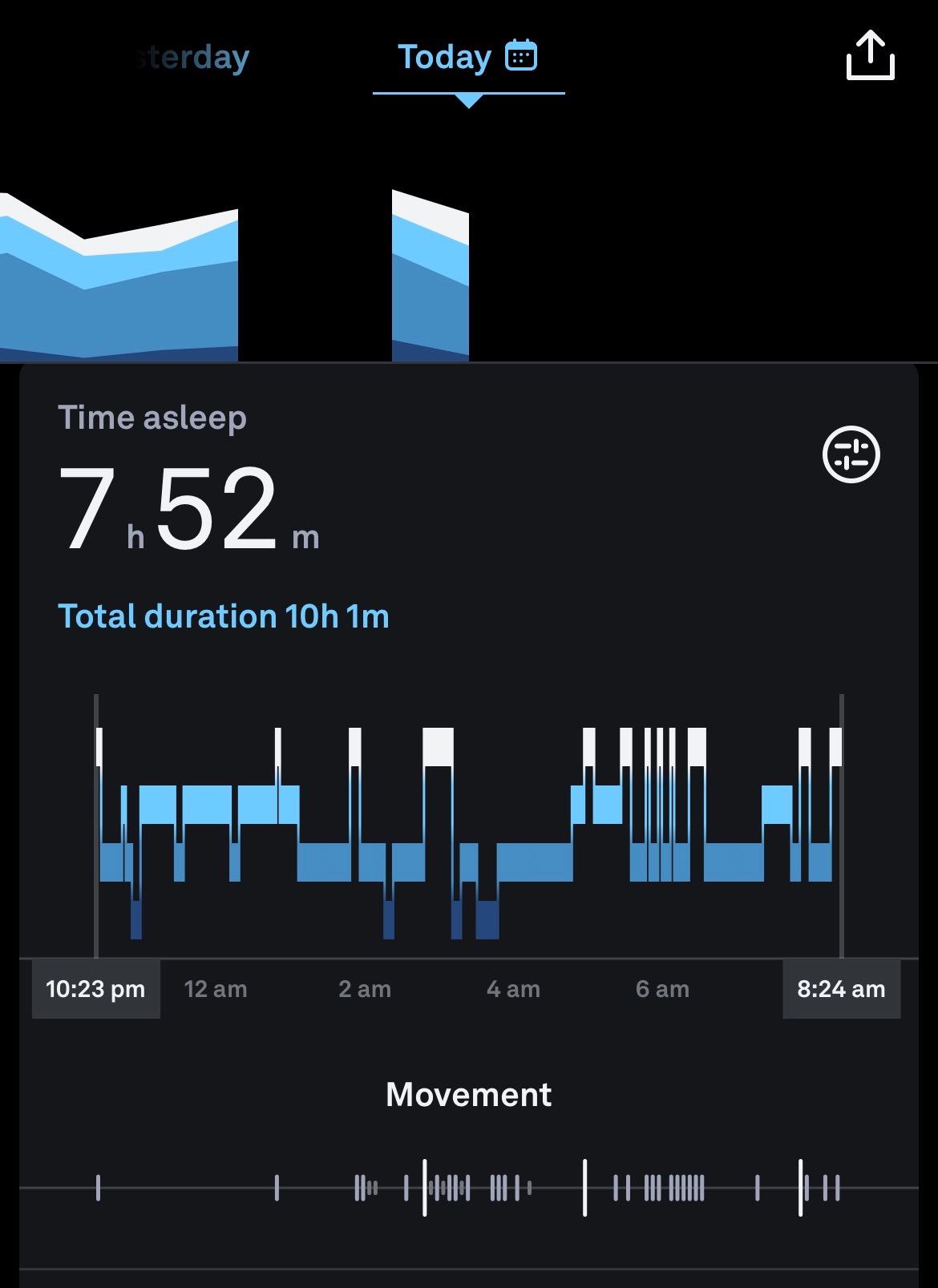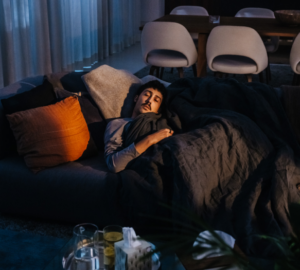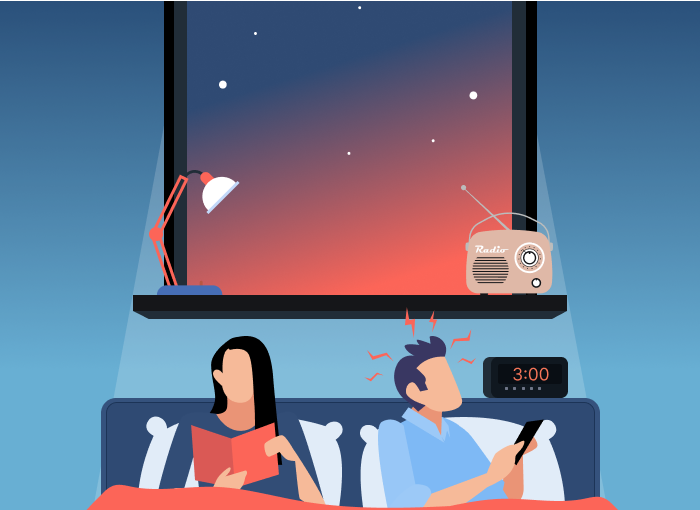- Sleep latency is the amount of time it takes to fall asleep, which is typically between 10 and 20 minutes.
- Oura members can see their sleep latency in their Sleep Tab, as it’s one of the contributors to their overall Sleep Score.
- Generally, a latency that’s less than 5 minutes may be a sign that you’re overtired, while a latency consistently longer than 20 minutes may signal a sleep disorder, such as insomnia.
After climbing into bed at night and turning off the lights, the last thing you want to do is lie awake, staring into the darkness. If this sounds familiar, you might wonder: How long does it take to fall asleep at night?
The amount of time it takes to fall asleep after going to bed is known as sleep latency. For most people, the average time it takes to fall asleep is between 10 and 20 minutes.
| Member Tip: As a Sleep Score contributor, your sleep latency impacts your Sleep Score if it’s abnormally high or low. If Oura often tells you to “pay attention” to your sleep latency, consider making some lifestyle changes or speak with your healthcare provider. |
Low Sleep Latency: Can You Fall Asleep Too Quickly?

A lower-than-average sleep latency might be normal on occasion. But if it persists for a long period of time, it could be a sign of other sleep problems. These may include:
Sleep Deprivation
When you don’t get enough sleep over a long period of time, you’re sleep-deprived and your circadian rhythm is disrupted. The longer you stay awake, the more your body craves sleep. So, if you’re sleep-deprived, you’ll likely doze off faster than someone who’s well-rested.
Signs of sleep deprivation include excessive tiredness during the day, irritable moods, needing caffeine or naps to get through the day, or weight gain.
Sleep Debt
Sleep debt is the gap between the hours you actually sleep and the hours your body needs. To settle the score, you’ll need extra snooze time. Lose sleep for a few nights? Plan on a few more nights of solid sleep to square up the sleep debt.
Other Potential Factors
- Excessive alcohol consumption
- Some medications, such as sedating antidepressants
- Certain health issues such as sleep apnea, narcolepsy, or a brain injury
If you notice you regularly fall asleep in under five minutes, take steps to improve your sleep hygiene or consult your doctor if you think it’s a cause for concern.
READ MORE: 5 Ways to Upgrade Your Sleep Hygiene
High Sleep Latency: Why Does It Take So Long to Fall Asleep?
If you’ve tried adjusting your sleep hygiene and are still struggling with sleep latency or poor sleep, there may be other factors at play.
1. Health Conditions
Some physical and mental health conditions can make it hard to fall asleep at night, including:
- Chronic pain
- Heart disease
- Diabetes
- Endometriosis
- Heartburn or acid reflux
- Anxiety
- Depression
2. Sleep Disorders

Sleep disorders like insomnia, obstructive sleep apnea, and restless leg syndrome can prevent you from falling asleep easily at night.
For Oura members, their sleep data can provide clues about what might be going on.
For instance, the Nighttime Movement feature can show you whether you experience excessive movement during the night, which could be an indication of restless leg syndrome or periodic limb movement disorder.
If you suspect you have obstructive sleep apnea, consult the Blood Oxygen Sensing (SpO2) feature and your breathing regularity to see whether breathing disturbances might be affecting your sleep.
3. Circadian Rhythm Disruptions
Working night shifts and other irregular sleep schedules can cause disruptions to your circadian rhythm (the internal clock that regulates your wake-sleep cycle) that make it difficult to fall asleep.
Another disruptor is jet lag, which is no longer limited to physical travel across time zones — you can now experience virtual jet lag by staying up too late or waking up too early for a virtual meeting or interview.
Additionally, those who like to stay up late socializing on the weekends may experience social jet lag that makes it harder to get back into a regular sleep routine.
| Member Story: As a pharmacist with a challenging shift-work schedule, Linda D. uses Oura to improve her recovery after her mentally and physically demanding work shifts. |
4. Stress
Stress and sleep are deeply interlinked: a lack of sleep can contribute to stress, while stress can affect your sleep quality in various ways — including your sleep latency. Oura members can use the Daytime Stress feature to learn how stress is affecting them during the day, and what they can do to bring their body into a more relaxed state.
Breathwork exercises, journaling, and light exercise can all help reduce stress, especially before bed.
RELATED: 14 Science-Backed Ways to Wind Down Before Bed
5. Medications
A number of commonly prescribed medications can affect sleep latency, including cold and allergy decongestants, antidepressants, beta-blockers, stimulants, and steroids.
If you think your medication is preventing you from falling asleep, speak to your doctor about alternatives.
How to Improve Sleep Latency
Improving your sleep latency will depend on your personal situation. For instance, if you tend to eat large meals late at night, switching to an earlier dinner time or eating a lighter bedtime snack may help improve your sleep latency.
It’s also important to give your body and mind enough time to wind down and prepare for sleep in the evenings, so if you usually work until late or stay up watching Netflix or scrolling through social media, consider creating a relaxing, sleep-inducing bedtime routine.
You’ll also want to take a look at your overall sleep hygiene, which includes the habits and behaviors around sleep. A few tips include:
- Limit caffeine, alcohol, and sugar consumption.
- Eat your last meal at least two hours before bed.
- Make sure you get enough regular exercise, but not too late in the evening.
- Try guided meditation or breathing exercises before heading to bed.
- While naps can boost your energy, napping too much or taking a nap too late in the day may make it harder to fall asleep at night.
- Optimize your sleep environment by keeping your bedroom cool, dark, and quiet.
- Take a warm bath or shower before bed to help you relax.
| Member Tip: Use Tags and Trends to track how different lifestyle changes affect your sleep latency over time, and make adjustments accordingly. For example, if you notice that late-night exercise leads to higher sleep latency, consider switching to a morning workout. |
READ MORE: How to Fall Asleep Fast





